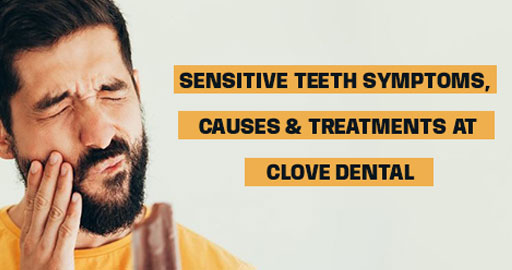
Sensitive Teeth Symptoms, Causes & Treatments at Clove Dental
Table of Contents
Sensitive teeth, medically known as dentin hypersensitivity, can cause discomfort and pain when you consume hot or cold foods and drinks, or when you expose your teeth to air. It’s a common dental issue that affects millions of people worldwide. If you’ve been experiencing tooth sensitivity, you’re not alone, and the good news is that there are effective treatments available at Clove Dental to alleviate your discomfort. In this blog, we’ll explore the symptoms, causes, and treatments for sensitive teeth.
Symptoms of Sensitive Teeth
Some of the symptoms of sensitive teeth are as follows:
- Sharp Pain: Sensitive teeth often manifest as a sharp, sudden pain when exposed to certain triggers. This can include hot or cold beverages, sweet foods, or even cold air.
- Discomfort While Brushing: If you experience pain or discomfort while brushing your teeth, it may be a sign of tooth sensitivity.
- Gum Sensitivity: Sensitive teeth can also cause gum sensitivity. You might feel pain when your gums come into contact with certain foods or temperatures.
- Tooth Pain During Dental Procedures: Many individuals with sensitive teeth experience heightened discomfort during dental cleanings or procedures.
- Sensitivity to Sweets: Sugary foods and drinks can exacerbate tooth sensitivity, causing discomfort and pain.
Common Causes of Sensitive Teeth
Thin or Worn Enamel: Enamel is the protective layer covering your teeth. When it becomes thin due to factors like aggressive brushing or acidic foods, it can expose the sensitive dentin beneath.
- Tooth Decay: Cavities and tooth decay can lead to sensitive teeth, as they damage the tooth structure.
- Gum Recession: Receding gums can expose the tooth’s roots, which are not as well-protected as the crown, making them more sensitive.
- Teeth Grinding: Bruxism, or teeth grinding, can wear down enamel and increase tooth sensitivity.
- Cracked Teeth: Cracks or fractures in your teeth can allow bacteria to enter, causing pain and sensitivity.
- Dental Procedures: Temporary sensitivity can occur after certain dental treatments, such as teeth whitening or fillings, but it usually subsides over time.
Effective Treatments for Sensitive Teeth at Clove Dental
Desensitizing Toothpaste: Clove Dental recommends using desensitizing toothpaste that contains compounds like potassium nitrate or strontium chloride. These ingredients help block pain signals from the nerve to the tooth.
- Fluoride Treatment: In-office fluoride applications can strengthen the enamel, reducing sensitivity.
- Dental Bonding: Dental bonding involves applying a resin to the exposed roots to protect them and reduce sensitivity.
- Gum Grafting: In cases of severe gum recession, gum grafting can be performed to cover exposed roots and reduce sensitivity.
- Orthodontic Treatment: If misaligned teeth are contributing to your tooth sensitivity, orthodontic treatment may be recommended to correct the issue.
- Changing Oral Habits: Clove Dental professionals can provide guidance on proper oral care techniques and habits, such as avoiding aggressive brushing and choosing a soft-bristle toothbrush.
Conclusion
Sensitive teeth can be a source of significant discomfort, but you don’t have to endure the pain. At Clove Dental a dental clinic near you, we have a range of effective treatments to address tooth sensitivity.
The first step is to schedule an appointment with one of our experienced dentists who can assess your condition and recommend the most suitable treatment for you. Don’t let sensitive teeth hold you back from enjoying your favorite foods and beverages; take action today and regain your comfort and confidence in your smile.
Leave a Reply
Leave a Reply
Explore More Similar Posts
Explore More Blogs


Leave a Reply